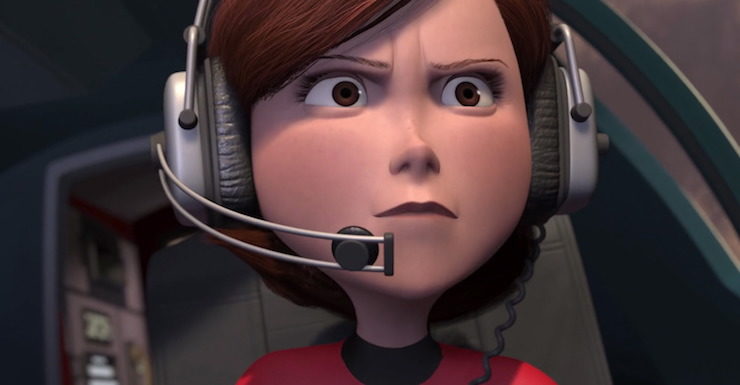It’s a common trope in SFF literature and film that moms (and sometimes both parents) are either deceased or evil. But in honor of Mother’s Day we want to celebrate the moms who are neither fridged nor villains—the ones will nurture, support, and kick ass to protect their kids… and sometimes save the planet and/or the future in the process.
Joyce Byers, Stranger Things
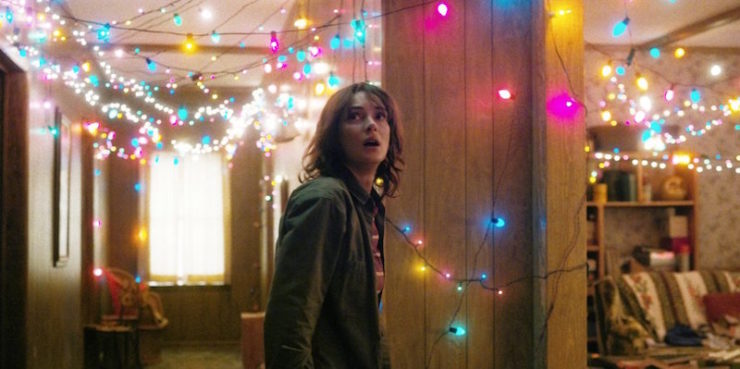
It’s easy to laugh at Joyce Byers’ over-the-top terror in Stranger Things, and it’s easy to get hung up on the nostalgia stunt casting of having ‘90s icon Winona Ryder playing a suburban mom. But those reaction miss the depth of both the character and the actor playing her. She could have been an object of ridicule: the poor trailer trash mom who was always just at the edge of crazy, and finally topple right over with her screaming and Christmas light. Instead, she become one of the show’s heroes. Joyce is the first to realize that Will’s disappearance is metaphysically strange, she’s the one who figures out a way to use Christmas lights to communicate with the Upside Down, she’s the one who talks Eleven through contact with the Demogorgon, and finally, she’s the one who confronts Evil Matthew Modine to get her son back. Ryder starts from a baseline of a very poor woman trying to raise two sons alone, adds in the all-consuming panic of losing one of those children, and then gradually lets us see the core of strength underneath it all. —Leah
Briar Wilkes, Boneshaker
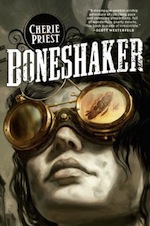
When her teenage son splits for zombie-infested alternate-history Seattle, Briar Wilkes pulls on her boots, cleans her father’s rifle, and heads in after him. Ezekiel—Zeke for short—is a good kid, an idealist who wants to prove something about his father’s past. (His father who, oh, no big deal, is responsible for the state of the city, thanks to an invention gone awry.) Briar is much more pragmatic, and that pragmatism serves her well when she finds that Seattle is not quite as empty as people have been led to believe. Resilient and kind and with a few secrets of her own, Briar is the down-to-earth star of Priest’s steampunk tale. —Molly
Molly Weasley, The Harry Potter Series
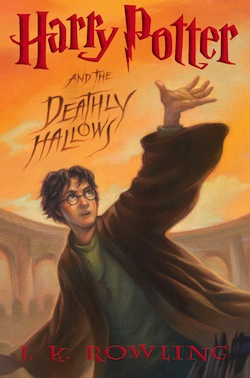 Molly Weasley isn’t just a mother to her seven children; Molly Weasley is mother to anyone who is missing one. When her youngest son Ron befriends Harry Potter, an orphan who has gone unloved by his extended family for the first eleven years of his life, she takes it upon herself to give him the sort of love and care that he has never been shown in his life. She knits him sweaters and fills him up with good food and hugs him when he’s been through too much. Oh, and then there’s that matter of helping to lead a resistance against the most evil Dark Wizard the world has ever seen while worrying the whole time for her family. Fighting for their right to live and trying to keep everyone in her orbit safe. Molly Weasley will be your mom too, if you need it. She has so much room in her heart, it’s no wonder she creates home wherever she goes. —Emily
Molly Weasley isn’t just a mother to her seven children; Molly Weasley is mother to anyone who is missing one. When her youngest son Ron befriends Harry Potter, an orphan who has gone unloved by his extended family for the first eleven years of his life, she takes it upon herself to give him the sort of love and care that he has never been shown in his life. She knits him sweaters and fills him up with good food and hugs him when he’s been through too much. Oh, and then there’s that matter of helping to lead a resistance against the most evil Dark Wizard the world has ever seen while worrying the whole time for her family. Fighting for their right to live and trying to keep everyone in her orbit safe. Molly Weasley will be your mom too, if you need it. She has so much room in her heart, it’s no wonder she creates home wherever she goes. —Emily
Sarah Connor, Terminator 2: Judgement Day
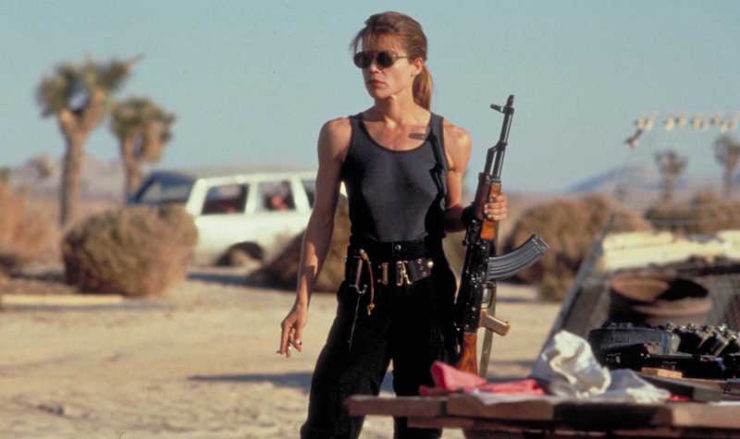
Some pop culture moms nurture, but others dedicate a decade of their lives to getting freaking ripped so they can stop the apocalypse and save their sons. Sarah Connor’s the second type. Debuting in the first Terminator as a typical bubbly-then-terrified blonde, we meet Sarah again in the opening of Terminator 2, drenched in sweat, gritting her teeth, doing pull-ups in a mental hospital. We soon learn that her son is in foster care and pretty much hates her; everyone thinks she’s crazy because she won’t shut up about killer robots and the end of the world; and she’s right about everything. But when the re-tooled Terminator shows up and she and her kid go on the lam together to escape the T-1000, John Connor sees her through new eyes and realizes that she’s been dedicated to his safety all along. —Leah
Alana, Saga
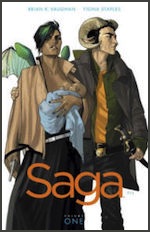 In the early issues of Saga, Alana does everything with her infant daughter Hazel strapped to her body: breastfeeding (in public, no less), smashing enemies, and holding up would-be kidnappers with her Heartbreaker gun. She holds Hazel close to her heart because Hazel is the number-one priority in her life. Yet she is careful not to conflate protecting Hazel with giving up her own life, after her father put aside his wants to “provide for his family” and just wound up abusing them out of resentment. Instead, she says, “I want to show our girl the universe.” If that means getting kidnapped (and sometimes separated), playing a costumed character on the Open Circuit series and getting hooked on Fadeaway, and fighting off anyone who wants to break up their family… then so be it. —Natalie
In the early issues of Saga, Alana does everything with her infant daughter Hazel strapped to her body: breastfeeding (in public, no less), smashing enemies, and holding up would-be kidnappers with her Heartbreaker gun. She holds Hazel close to her heart because Hazel is the number-one priority in her life. Yet she is careful not to conflate protecting Hazel with giving up her own life, after her father put aside his wants to “provide for his family” and just wound up abusing them out of resentment. Instead, she says, “I want to show our girl the universe.” If that means getting kidnapped (and sometimes separated), playing a costumed character on the Open Circuit series and getting hooked on Fadeaway, and fighting off anyone who wants to break up their family… then so be it. —Natalie
Mrs. Murry, A Wrinkle in Time
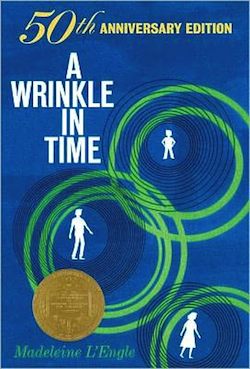
It’s been well established that Meg Murry, prickly heroine of A Wrinkle in Time, is one of the best characters of all Chronos and Kairos. But can we talk about her mom for a minute? Here was a woman with flawless skin and red waves of hair, who chose to pursue a career in science in mid-20th-century America, and balance that career with a marriage to an absent-minded genius and four (!!!) children. This was a woman who co-developed tesseract theory with her husband, and supported him during his experiments. She kept her composure and raised their kids after he disappeared, while still continuing her own research, all while knowing that the other women in town snarked about Dr. Murry running away with another woman, and the other parents thought she was a freak with freak children. The woman cooks her children’s dinner on a Bunsen burner. She’s just as smart as her husband, just as weird, but she’s also cool enough to accept Mrs. Whatsit, to provide emotional support to Calvin O’Keefe, to accept her angry daughter and terrifying precocious youngest son with the same love that she extends to her handsome, well-adjusted middle sons. She’s the best. —Leah
Helen Parr, The Incredibles
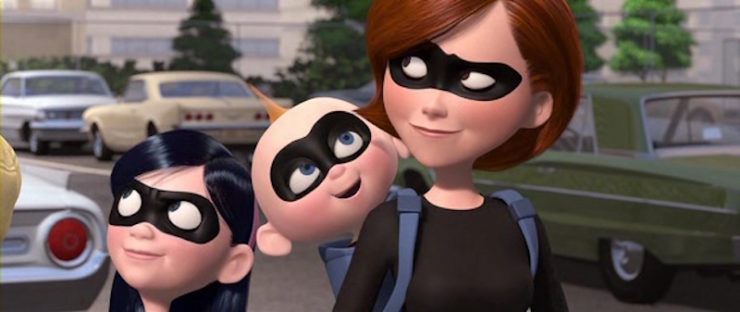
You try having a family full of superheroes (baby included). It sounds like a dream, falling in love with another person who has special powers like you, right? You don’t have to create fake names and hide behind assumed identities, and make up excuses for why you’re always sneaking out at night or coming home too late. But when Helen married Bob Parr, a.k.a. Mr. Incredible, what she ended up with was a family full of superpowered trouble. And no matter what, she intends to keep them together and safe. When Bob starts yearning for the old days and gets himself into a whole heap of danger, Helen goes after him—unknowingly accompanied by two of her children. They manage to get Bob back and save Metroville in the process, largely due to Helen’s superb espionage skills, creativity, and supreme elasticity. That’s right, she’s the mother in her family, and she’s infinitely flexible—hey, we never said the metaphors here were subtle. —Emily
Mistress Gideon, Of Sorrow & Such
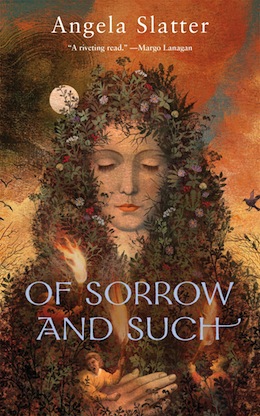 Patience Gideon lives quietly enough in Edda’s Meadow. She’s a witch, which is illegal, but is also very handy if you need certain kinds of medical care, and so she is tolerated, for the most part. Everything changes when a young shapeshifter shows up, running away from some poor decisions, and Patience is caught up in an actual witch-hunt. Resourceful, practical, skilled, and clever, Patience harbors a deep anger toward those who use and threaten witches. She takes care of her adoptive daughter, Gilly, but she does more than that: she models a life spent looking out for and cooperating with other women. Her magical power is considerable, but it’s not the only thing she’ll rely on to get herself (and others) out of trouble. —Molly
Patience Gideon lives quietly enough in Edda’s Meadow. She’s a witch, which is illegal, but is also very handy if you need certain kinds of medical care, and so she is tolerated, for the most part. Everything changes when a young shapeshifter shows up, running away from some poor decisions, and Patience is caught up in an actual witch-hunt. Resourceful, practical, skilled, and clever, Patience harbors a deep anger toward those who use and threaten witches. She takes care of her adoptive daughter, Gilly, but she does more than that: she models a life spent looking out for and cooperating with other women. Her magical power is considerable, but it’s not the only thing she’ll rely on to get herself (and others) out of trouble. —Molly
Dr. Jo Baker, Destroyer
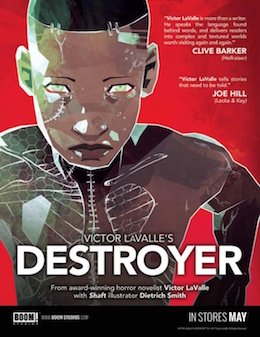 The only living descendant of the Frankenstein family not killed by the monster, Josephine winds up channeling her infamous ancestor after her son Akai is murdered in a police shooting: She brings the boy back to life using not limbs from corpses but modern robotics and AI technology. The all-consuming grief of losing her child utterly transforms Jo, pushing her to the brink of madness as her raw anger gives her the resolve to hurt anyone who would get between her and Akai. Including Frankenstein’s monster, who has decided to leave the Arctic for the first time in over 200 years to wage war on humanity. He’s in for a nasty surprise. —Natalie
The only living descendant of the Frankenstein family not killed by the monster, Josephine winds up channeling her infamous ancestor after her son Akai is murdered in a police shooting: She brings the boy back to life using not limbs from corpses but modern robotics and AI technology. The all-consuming grief of losing her child utterly transforms Jo, pushing her to the brink of madness as her raw anger gives her the resolve to hurt anyone who would get between her and Akai. Including Frankenstein’s monster, who has decided to leave the Arctic for the first time in over 200 years to wage war on humanity. He’s in for a nasty surprise. —Natalie
Mace, Strange Days
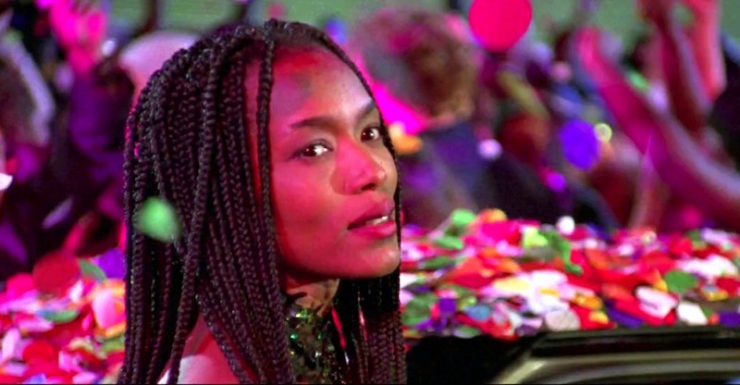
Strange Days is an extraordinary, underrated film, but the thing that always surprises me most about it is the awesome mom at its center. While Ralph Fiennes’ Lenny Nero is the cop-turned-conman hero, and Juliette Lewis’ Faith is the flashy wannabe rock star, it’s Angela Bassett’s Mace who acts as the moral core of the film. She’s the one who gives us a reason to care about the movie. When we meet Mace, we see her as Lenny’s sensible sidekick, and she (barely) tolerates his smarm with the deadpan resignation of an old friend. But then the film follows her into her home life, and we see that she’s a single mom, trying to keep her son safe in a world that is hostile to everyone, but especially to young men with dark skin. We also learn that the only reason Lenny has her in his life is because once, long ago, he was kind to her child. This thread of empathy between them is what binds them together, and in the midst of a brutal near-future dystopia, the only hopeful scenes are those with a mother trying to make a better world for her child. —Leah
Essun, The Broken Earth trilogy
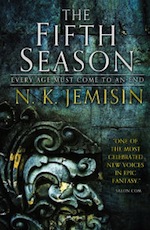 The overarching story propelling N. K. Jemisin’s Broken Earth trilogy is Essun’s search for her kidnapped daughter, a task made infinitely more difficult by the fact that the world is in the midst of ending. Jemisin treats motherhood in a way that constantly challenges the reader. Essun is distant and filled with cold rage, becoming more and more calculating as the series continues, making the reader question whether Essun reuniting with her daughter is a good thing for either of them. And yet, Essun cares dutifully for those who come into her orbit. It is joyless and thankless, but it is what we expect from mothers, and Jemisin does not shy away from how brittle and ugly such dutiful caretaking can be for a mother. Holding up the world, be it your family, your community, or the actual planet itself, is not fun, and The Broken Earth trilogy is an important and honest representation of that reality through fiction. You don’t really like Essun, but by the end of the first book (The Fifth Season) you have pinned all of your hopes onto her.
The overarching story propelling N. K. Jemisin’s Broken Earth trilogy is Essun’s search for her kidnapped daughter, a task made infinitely more difficult by the fact that the world is in the midst of ending. Jemisin treats motherhood in a way that constantly challenges the reader. Essun is distant and filled with cold rage, becoming more and more calculating as the series continues, making the reader question whether Essun reuniting with her daughter is a good thing for either of them. And yet, Essun cares dutifully for those who come into her orbit. It is joyless and thankless, but it is what we expect from mothers, and Jemisin does not shy away from how brittle and ugly such dutiful caretaking can be for a mother. Holding up the world, be it your family, your community, or the actual planet itself, is not fun, and The Broken Earth trilogy is an important and honest representation of that reality through fiction. You don’t really like Essun, but by the end of the first book (The Fifth Season) you have pinned all of your hopes onto her.
Pinion, The Traitor Baru Cormorant
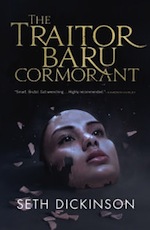 While young Baru loves her fathers, smith Solit and shield-bearer Salm, the parent she truly admires is her mother. Pinion is a famed huntress on the island of Taranoke; Baru likens her to “a coil of storm surf, a thunderbolt, as slow and powerful as sunlight.” More important than strength or stealth, what Pinion passes down to Baru is knowledge, and the drive to obtain more. But from the moment that the Empire of Masks’ ships anchor in Taranoke’s harbor, Pinion doesn’t have the answers anymore. This is the first wedge driven between mother and daughter, as the latter seeks to be educated in the Masquerade’s schools, both to gain that precious knowledge and to destroy it from the inside. What neither she nor Pinion could have guessed is how fully the Masquerade sinks its claws into her, so that the next time they see each other, a decade later, that moment of not knowing has created such a gulf that they have no way of understanding one another. Baru may have more technical knowledge than her mother, but Pinion knows that Baru is nearly lost to her. —Natalie
While young Baru loves her fathers, smith Solit and shield-bearer Salm, the parent she truly admires is her mother. Pinion is a famed huntress on the island of Taranoke; Baru likens her to “a coil of storm surf, a thunderbolt, as slow and powerful as sunlight.” More important than strength or stealth, what Pinion passes down to Baru is knowledge, and the drive to obtain more. But from the moment that the Empire of Masks’ ships anchor in Taranoke’s harbor, Pinion doesn’t have the answers anymore. This is the first wedge driven between mother and daughter, as the latter seeks to be educated in the Masquerade’s schools, both to gain that precious knowledge and to destroy it from the inside. What neither she nor Pinion could have guessed is how fully the Masquerade sinks its claws into her, so that the next time they see each other, a decade later, that moment of not knowing has created such a gulf that they have no way of understanding one another. Baru may have more technical knowledge than her mother, but Pinion knows that Baru is nearly lost to her. —Natalie
Jackie Tyler, Doctor Who
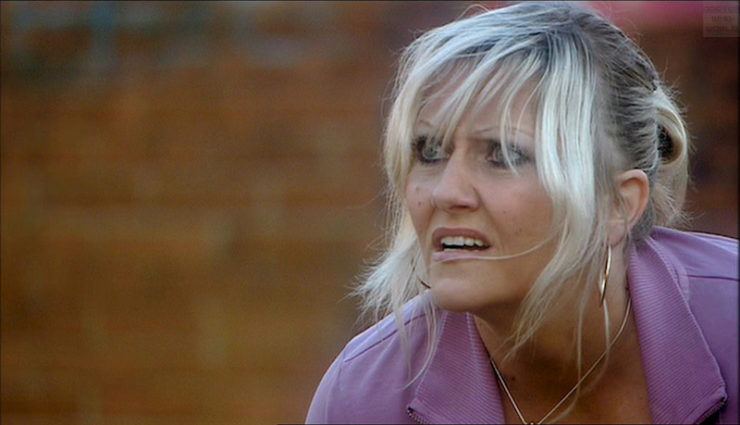
Jackie Tyler literally crossed dimensions to find her daughter. Your argument is invalid. All arguments are invalid against Jackie Tyler because she raised her daughter Rose as a single mother on a council estate, and after losing her husband in a car crash. And people may laugh at Jackie Tyler because they think that she’s trashy, or silly, or overbearing, but nothing stops her from protecting her daughter and the weird life she’s chosen, traveling the universe with a Time Lord. Jackie Tyler is the only family member of a companion to slap the Doctor and then turn around and invite him over for Christmas dinner, and he has to say yes because you don’t say no to Jackie Tyler. (You don’t say no to Rose either—because Jackie Tyler is her mum.) That Rose is equally protective over her mother goes without saying. She is loud and she is pushy, but there is no better person to have in your corner than Jackie, and Rose knows that she has a lot to be thankful for. —Emily
Tenar, Tehanu
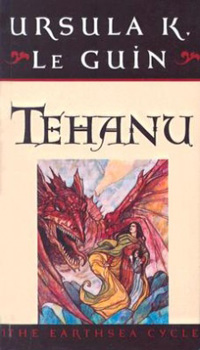 In the time between The Tombs of Atuan and Tehanu, Tenar changes. A lot. Once the child priestess of the Nameless Ones, the tiny ruler of a dark labyrinth, by the time of Tehanu she is a lonely widow, the mother of two grown children. When an abandoned, severely injured child is brought to her, Tenar adopts the girl, naming her Therru. Ged comes back into Tenar’s life in this book, but the story remains hers—a story shaped by living and working in a world ruled by men. Tehanu is a glorious book built around a complicated, atypical heroine, a quietly magical reminder that different kinds of lives are all heroic and worthy of tales. —Molly
In the time between The Tombs of Atuan and Tehanu, Tenar changes. A lot. Once the child priestess of the Nameless Ones, the tiny ruler of a dark labyrinth, by the time of Tehanu she is a lonely widow, the mother of two grown children. When an abandoned, severely injured child is brought to her, Tenar adopts the girl, naming her Therru. Ged comes back into Tenar’s life in this book, but the story remains hers—a story shaped by living and working in a world ruled by men. Tehanu is a glorious book built around a complicated, atypical heroine, a quietly magical reminder that different kinds of lives are all heroic and worthy of tales. —Molly
Dr. Abby Griffin, The 100
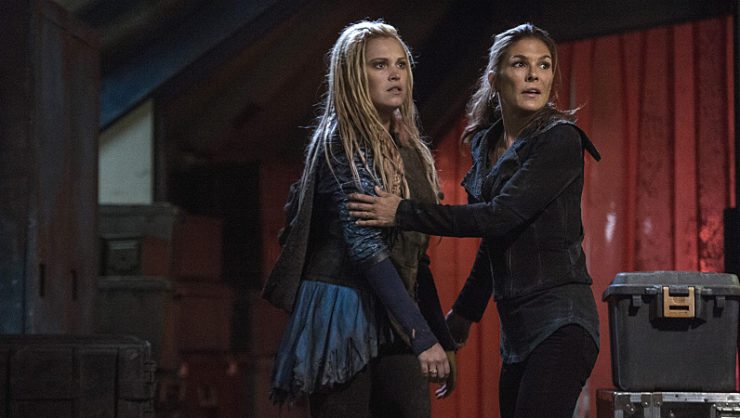
Abby and her daughter Clarke seem to constantly trade which of them is the mother, or at least the more knowledgeable/competent one: In an extreme take on “Mother knows best,” Abby sends her only child down to Earth with 99 other juvenile delinquents in the hopes that these kids can figure out survival on an irradiated planet; then, when the “adults” finally land, Clarke will be the one to show her the lay of the land and how to throw a spear. The constant back-and-forth shift of authority actually strengthens their relationship, as each trusts the other to do what needs to be done in the moment. Like when Clarke was ready to let her AI-controlled Abby almost asphyxiate herself because she needed to save everyone from the City of Light. Surprisingly, mother and daughter were OK even after that.
Also, Abby is the best surrogate mom to Raven. —Natalie










